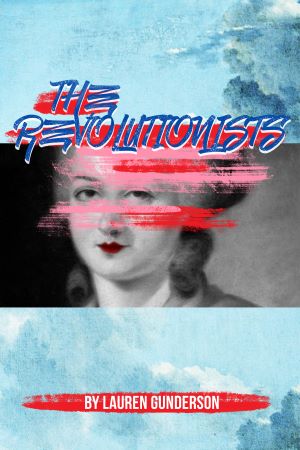As the Reign of Terror in France explodes all around them in 1793, four women – three real, one a composite – gather in the home of playwright Olympe de Gouges to rewrite history (her-story), set the record straight, and save France.
Lauren Gunderson‘s The Revolutionists – the second production in Triad Stage’s reopening season after the storms of COVID and some management changes – opened this past Friday night. Artistic director Sarah Hankins has directed the ensemble cast with a sense of both ease and gravity, while Gunderson’s deceptively breezy script reveals, the depth, courage, and whimsy of women throughout all times and places.
The three guests in Olympe’s home office all have their own agenda, and all want her to write their stories for them.
Marianne Angelle, a freedom fighter from the French colony of Saint Domingue (present-day Haiti), wants Olympe to write political pamphlets calling for the end of slavery.
Charlotte Corday aims to assassinate Jean-Paul Marat, a Jacobin factionalist and journalist who was partly responsible for the violent turn that the French Revolution took. She wants Olympe to write her last words for her.
The third guest needs no introduction: Queen Marie Antoinette wants Olympe to pen a vindication of her role in the monarchy’s oppression of the French people.
And, of course, Olympe has her own agenda: She wants to keep writing and selling plays; she wants to be a popular playwright. But, she also loves France and her “friends.” She, too, wants to be a hero, to help France, and to give women a voice in the national conversation about liberté, egalité, and fraternité, the battle cry of the French Revolution.
Lalenja Harrington plays Marianne Angelle, a composite character, with fire and gravity. Marianne is the first to arrive at Olympe’s home where the playwright is struggling with writer’s block and trying to resist starting a play with a beheading. Marianne begs her to stop using her skills in the frivolity of art and use them to call attention to the real-life needs of the country and the people. Harrington’s rich voice and powerful presence served the role of Marianne beautifully, embodying bravery and sorrow.
Next to enter the scene is Charlotte Corday, played by Abigail Wilson with the passion and arrogance of youth. Wilson’s Corday was unstoppable and ungovernable. The viewer had no doubt that she would march fearlessly into Marat’s home, charm everyone in his circle of protectors, and stab him dead in his bathtub, and then die by guillotine for her crime. Wilson wowed both the characters in the play and the audience with her self-possession and sense of certainty.
Elizabethe Gene played Marie Antoinette, last to arrive, with pitch-perfect petulance. Gene’s Marie is bouncy and funny. Known to be a lover of coffee and sweets, Marie is crashing from a lack of either, which makes her both ridiculous and relatable. She wields a bouquet of ribbons, which she alternately uses as a whip and as rewards to the other women.
In the role of Olympe, A.C. Donohue showed great emotional range and a great talent for physical comedy: see her practically leap off the stage in her joy and creep across the set in craven, but justifiable fear for her life.
The substance and message of the play are supported in great style by the simply furnished, blood-tinged set by scenic designer Natalie Taylor Hart. Two paintings of French mobs (or audiences?) flank the stage.
Olympe’s writing desk is littered with pastel-colored legal pads, a theme echoed in her faintly lavender powdered wig and pale-blue dress by costume designer Jack Smith. Lighting design by Maranda DeBusk and sound design by G. Clausen help build some magical moments on stage, including the death of Marat, and crowds cheering in the background.
There are some great one-liners. “No one wants a play about the French Revolution,” Marianne says, obliquely referencing Les Miserables. “I can’t listen when I’m whining,” Olympe says. In a reference to Clue, the board game or the play, one character says, “Marat. In the bathtub. With a steak knife.”
An actual playwright, Olympe became more and more politically engaged as the Revolution progressed, writing pamphlets that promoted the rights of women and the abolition of slavery. Like Marie and Charlotte, she was executed by guillotine for her outspokenness and her beliefs.
Olympe most likely never met the other women in the play, but it’s easy to imagine their spirits gathering to watch and worry over women’s present-day struggles for liberté, egalité, and sororité.
The Revolutionists continues through Sunday, April 2. For more details on this production, please view the sidebar.











